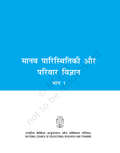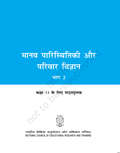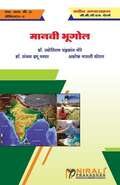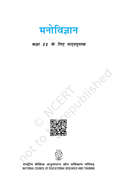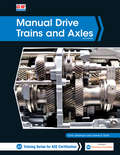- Table View
- List View
Manav Paristhitiki Evan Parivaar Vigyan Bhag 1 Class 12 - NCERT - 23: मानव पारिस्थितिकी एवं परिवार विज्ञान भाग-१ १२वीं कक्षा - एनसीईआरटी - २३
by Rashtriy Shaikshik Anusandhan Aur Prashikshan Parishadमानव पारिस्थितिकी एवं परिवार विज्ञान (एच.ई.एफ.एस.) विषय जो अब तक ‘गृह विज्ञान’ के रूप में जाना जाता है, इसकी पाठ्यपुस्तकें एन.सी.ई.आर.टी. की राष्ट्रीय पाठ्यचर्या की रूपरेखा 2005 के दृष्टिकोण और सिद्धांतों के आधार पर विकसित की गई हैं। विश्व में, गृह विज्ञान का क्षेत्र नए नामों से जाना जाता है परंतु इसमें मूलरूप से पाँच क्षेत्र सम्मिलित हैं, जिनके नाम हैं- भोजन एवं पोषण, मानव विकास एवं परिवार अध्ययन, वस्त्र एवं परिधान, संसाधन प्रबंधन और संचार एवं विस्तारा इनमें से प्रत्येक क्षेत्र या विशेषज्ञता प्राप्त (जैसा कि विभिन्न कॉलेजों और विश्वविद्यालयों में निर्दिष्ट है) व्यक्तियों, परिवारों, उद्योग और समाज की बढ़ती ज़रूरतों को ध्यान में रख, बढ़ते हुए दायरे के साथ विकसित और परिपक्व हुआ है। परिणामस्वरूप, इन क्षेत्रों में रोजगार बाजार विकसित करने के उद्देश्य से नए आकर्षण विकसित किए गए हैं और बहुत से विश्वविद्यालयों में इनकी वर्तमान प्रतिष्ठा और कार्य क्षेत्र को बेहतर तरीके से दर्शाने के लिए इन्हें नए नाम दिए गए हैं।
Manav Paristhitiki Evan Parivaar Vigyan Bhag 2 class 12 - NCERT - 23: मानव पारिस्थितिकी एवं परिवार विज्ञान भाग-२ १२वीं कक्षा - एनसीईआरटी - २३
by Rashtriy Shaikshik Anusandhan Aur Prashikshan Parishadमानव पारिस्थितिकी एवं परिवार विज्ञान (एच.ई.एफ.एस.) विषय जो अब तक ‘गृह विज्ञान’ के रूप में जाना जाता है, इसकी पाठ्यपुस्तकें एन.सी.ई.आर.टी. की राष्ट्रीय पाठ्यचर्या की रूपरेखा 2005 के दृष्टिकोण और सिद्धांतों के आधार पर विकसित की गई हैं। विश्व में, गृह विज्ञान का क्षेत्र नए नामों से जाना जाता है परंतु इसमें मूलरूप से पाँच क्षेत्र सम्मिलित हैं, जिनके नाम हैं- भोजन एवं पोषण, मानव विकास एवं परिवार अध्ययन, वस्त्र एवं परिधान, संसाधन प्रबंधन और संचार एवं विस्तारा इनमें से प्रत्येक क्षेत्र या विशेषज्ञता प्राप्त (जैसा कि विभिन्न कॉलेजों और विश्वविद्यालयों में निर्दिष्ट है) व्यक्तियों, परिवारों, उद्योग और समाज की बढ़ती ज़रूरतों को ध्यान में रख, बढ़ते हुए दायरे के साथ विकसित और परिपक्व हुआ है। परिणामस्वरूप, इन क्षेत्रों में रोजगार बाजार विकसित करने के उद्देश्य से नए आकर्षण विकसित किए गए हैं और बहुत से विश्वविद्यालयों में इनकी वर्तमान प्रतिष्ठा और कार्य क्षेत्र को बेहतर तरीके से दर्शाने के लिए इन्हें नए नाम दिए गए हैं।
Manav Paristhitiki Evan Parivaar Vigyan Bhag-1 class 11 - NCERT - 23: मानव पारिस्थितिकी एवं परिवार विज्ञान भाग-१ ११वीं कक्षा - एनसीईआरटी - २३
by Rashtriy Shaikshik Anusandhan Aur Prashikshan Parishadमानव पारिस्थितिकी और परिवार विज्ञान भाग 1 11वीं कक्षा का राष्ट्रीय शैक्षिक अनुसंधान और प्रशिक्षण परिषद् ने पुस्तक हिंदी भाषा में प्रकाशित किया गया है, इस पुस्तक में कुल दो इकाईंयाँ हैं - इस पाठपुस्तक में सिखाने वाले के दृष्टीकोण से सभी क्षेत्रों में ज्ञान के पुन: निर्माण के प्रती और समकालीन भारत के गतिशील समाजिक–आर्थिक वास्तविकताओं का अध्ययन किया गया है। इस पाठ्यक्रम में जेन्डर संबंधी शिक्षा मुद्दो पर राष्ट्रीय समूह द्वारा गृह विज्ञान जैसे पारंपारिक रूप से परिभाषित विषयों समावेश किया गया है।
Manav Paristhitiki Evan Parivaar Vigyan Bhag-2 class 11 - NCERT - 23: मानव पारिस्थितिकी एवं परिवार विज्ञान भाग-२ ११वीं कक्षा - एनसीईआरटी - २३
by Rashtriy Shaikshik Anusandhan Aur Prashikshan Parishadमानव पारिस्थितिकी और परिवार विज्ञान भाग 2 11वीं कक्षा का राष्ट्रीय शैक्षिक अनुसंधान और प्रशिक्षण परिषद् ने पुस्तक हिंदी भाषा में प्रकाशित किया गया है, इस पुस्तक में कुल दो इकाईंयाँ हैं - इस पाठपुस्तक में सिखाने वाले के दृष्टीकोण से सभी क्षेत्रों में ज्ञान के पुन: निर्माण के प्रती और समकालीन भारत के गतिशील समाजिक-आर्थिक वास्तविकताओं का अध्ययन किया गया है। इस पाठ्यक्रम के अनुसार कपड़ों तथा पौशाकों के लिए प्रशिक्षण पाने वाले व्यक्तियों को वस्त्रोद्योग डिज़ाइन, वस्त्रोद्योग या फ़ैशन अथवा पौशाक उद्योग और उद्यमशीलता में भावी जीवनवृत्ति मिल सकती है।
Manava vidyava saha sinhala sanskruthiya - මානව විද්යාව හා සිංහල සංස්කෘතිය
by Martin Wickramasingha - මාර්ටින් වික්රමසිංහමගේ මේ "මානව විද්යාව හා සිංහල සංස්කෘතිය" සකු බමුණු ඉංගිරිසි අනුකාරකයන්ට ඔවුන්ගේ අනුකාරක සෙළුව දක්වන කැටපතක් වෙති යි සිතමි.
Manavi Bhugol (Gg - 110 B) FYBA Second Semester - SPPU: मानवी भूगोल (Gg - 110 B) एफ.वाय.बी.ए. सेमिस्टर २ - सावित्रीबाई फुले पुणे यूनिवर्सिटी
by A. B. Savadi P. S. Kolekarयु.जी.सी. च्या मार्गदर्शक तत्त्वानुसार नोव्हेंबर 2019 पासून सेमिस्टर-2 करिता 'मानवी भूगोल' (Gg - 110 B) हे क्रमिक पाठ्यपुस्तक आहे. सर्वसामान्यपणे भूगोलाच्या प्रमुख दोन शाखा आहेत. एक, प्राकृतिक भूगोल व दुसरे, मानवी भूगोल. पुणे विद्यापीठाने 'मानवी भूगोल' हा विषय एफ.वाय.बी.ए. सेमिस्टर-2 च्या भूगोल विषयाच्या अध्ययनासाठी निश्चित केला आहे. या नवीन अभ्यासक्रमात मानवी भूगोलाच्या एकंदर चार शाखा समावेश आहे. प्रत्येक प्रकरणातील संज्ञा/व्याख्या, संकल्पना, पारिभाषिक शब्द विद्यार्थ्यांनी आत्मसात करावेत. दर्जेदार वैज्ञानिक मांडणी करून मुद्द्यांचे सुलभतेने स्पष्टीकरण केले आहे. यामुळे संकल्पना स्पष्ट होतील.
Manavi Bhugol (Parichay va Pratyakshike) Second Semester FYBA New NEP Syllabus - SPPU: मानवी भूगोल (परिचय व प्रात्यक्षिके) दुसरे सत्र एफ.वाय.बी.ए. नवीन एन.इ.पी. अभ्यासक्रम - सावित्रीबाई फुले पुणे यूनिवर्सिटी
by Dr Jyotiram Chandrakant More Dr Sanjay Dagu Pagar Prof. Ashok Maruti Thorat Dr Dilip Dnyaneshwar Mulukमानवी भूगोल हा भूगोलाच्या महत्त्वाच्या शाखांपैकी एक असून, तो मानव आणि पर्यावरण यांच्यातील परस्परसंबंधांचा अभ्यास करतो. या विषयामध्ये लोकसंख्या, वसाहती, कृषी, आर्थिक क्रिया, सामाजिक आणि सांस्कृतिक घटकांचा समावेश होतो. मानवी भूगोलाच्या शाखांमध्ये आर्थिक भूगोल, सामाजिक भूगोल, कृषी भूगोल, औद्योगिक भूगोल, नागरी भूगोल, राजकीय भूगोल आणि पर्यटन भूगोल यांचा समावेश आहे. या विषयाचा विकास 18व्या शतकात सुरू झाला आणि पुढील काळात तो अधिक व्यापक होत गेला. मानवी भूगोलामध्ये लोकसंख्येचे वितरण, स्थलांतर, शहरीकरण, उद्योगधंदे, व्यापार, वाहतूक आणि विपणन यांचे सखोल विश्लेषण केले जाते. या अभ्यासामुळे मानवी जीवनावर भौगोलिक घटकांचा प्रभाव समजण्यास मदत होते. आधुनिक तंत्रज्ञान, उपग्रह प्रतिमा आणि भौगोलिक माहिती प्रणालीच्या मदतीने मानवी भूगोलाचा अभ्यास अधिक प्रभावीपणे केला जातो. त्यामुळे मानवी भूगोल हा वेगाने विकसित होणारा विषय असून, नियोजन व संसाधन व्यवस्थापनासाठी तो अत्यंत महत्त्वाचा आहे.
Manavi Bhugol FYBA Second Semester - SPPU: मानवी भूगोल एफ.वाय.बी.ए. सेमिस्टर २ - सावित्रीबाई फुले पुणे यूनिवर्सिटी
by Dr Jyotiram Chandrakant More Dr Sanjay Dagu Pagar Prof. Ashok Maruti Thoratसावित्रीबाई फुले पुणे विद्यापीठाने जून 2019 पासून बदललेल्या नवीन अभ्यासक्रमानुसार श्रेयांक पद्धत व सेमिस्टर लागू केलेली असून एफ.वाय.बी.ए. सेमिस्टर (II) करिता भूगोल विषयासाठी 'मानवी भूगोल' हे क्रमिक पाठ्यपुस्तक तयार केलेले आहे. प्रत्येक संकल्पनेला योग्य न्याय देऊन सुयोग्य माहिती, आकृत्या, नकाशा, रकाणे यांच्या आधारे लिखाण करण्यात आलेले आहे. 'मानवी भूगोलाचा परिचय' या पहिल्या प्रकरणात व्याख्या, स्वरूप, व्याप्ती, शाखा व त्यांचे महत्त्व यांचा आढावा घेतला आहे. 'लोकसंख्या' या दुसऱ्या प्रकरणामध्ये लोकसंख्येच्या वितरणावर परिणाम करणारे घटक, लोकसंख्या संक्रमण सिद्धान्त व भारतीय लोकसंख्येची रचना अशा महत्त्वपूर्ण घटकांचा समावेश केलेला आहे. तसेच प्रकरण तीनमध्ये मानवी वसाहत, ग्रामीण वसाहतीचे प्रकार, प्रारूप व आकृतिबंध तसेच भारतातील नागरीकरण व महाराष्ट्रातील नागरिकरणाचा समावेश केला आहे. याशिवाय शेवटच्या प्रकरणात कृषी, कृषीचे प्रकार, कृषीवर परिणाम करणारे घटक, भारतीय कृषीच्या समस्या यांचा समावेश केलेला आहे.
Manavi Bhugol TY BA Pune University
by A. B. Savadi P. S. KolekarManavi Bhugol Marathi text book for Third year from The Pune Universtity in Marathi.
Manavi Hakk Ani Samajik Nyayacha Parichay Paper 3 TYBA Sixth Semester - SPPU: मानवी हक्क आणि सामाजिक न्यायाचा परिचय पेपर ३ टी.वाय.बी.ए. सेमिस्टर ६ - सावित्रीबाई फुले पुणे यूनिवर्सिटी
by Dr Jyoti Suhas Gagangras Dr Sudhir Ashruba Yewle Vinayak Subhash Lashkar Vikramaditya Prabhakar Gaikwadतृतीय वर्ष बी. ए. जनरलचे ‘मानवी हक्क आणि सामाजिक न्यायाचा परिचय' हे पुस्तक वाचकांच्या हातात सोपविताना आम्हाला अतिशय आनंद होत आहे. सेमिस्टर-6 चे हे पुस्तक आहे. गुन्हा आणि समाज हे पुस्तक लिहिताना गुन्हाविषयक सैद्धान्तिक संकल्पना व विविध गुन्ह्यांविषयीचे विविध पैलू उलगडण्याचा प्रयत्न केला होता. या क्रमिक पुस्तकात 'मानवी हक्क आणि सामाजिक न्याय' याच्याशी संबंधित विविध पैलूंची मांडणी केली आहे.
Manavi Vikasache Arthashastra Second Semester FYBA New NEP Syllabus - RTMNU: मानवी विकासाचे अर्थशास्त्र दुसरे सत्र एफ.वाय.बी.ए. नवीन एन.इ.पी. अभ्यासक्रम - राष्ट्रसंत तुकडोजी महाराज नागपूर विद्यापीठ
by Prof. Dr. Rakshit Madan Bagde‘मानवी विकासाचे अर्थशास्त्र’ या पुस्तकात मानवी विकासाच्या विविध पैलूंचे विश्लेषण केले आहे. यात मानवी विकास म्हणजे काय, त्याचे अर्थ, व्याख्या, महत्त्व आणि उद्दिष्ट्ये काय आहेत, याबद्दल चर्चा केली आहे. या पुस्तकात मानवी विकासाकडे बघण्याचे विविध दृष्टिकोन स्पष्ट केले आहेत, जसे की मूलभूत गरजा दृष्टिकोन, गुणवत्ता जीवन दृष्टिकोन आणि क्षमता दृष्टिकोन. मानवी सुरक्षा, शाश्वत विकास उद्दिष्ट्ये आणि मानवी विकासासाठी दृष्टीकोन यावरही चर्चा करण्यात आली आहे. यात आर्थिक सुरक्षा, अन्न सुरक्षा, आरोग्य सुरक्षा, पर्यावरण सुरक्षा, व्यक्तिगत सुरक्षा, समुदाय सुरक्षा आणि राजकीय सुरक्षा यांचा समावेश आहे. पुस्तकात मानवी विकासाचे परिमाण आणि त्याचे मोजमाप कसे करायचे, याची माहिती दिली आहे. यात सशक्तीकरण, सहकार्य, समता, शाश्वतता, सहभाग आणि उत्पादकता यांसारख्या घटकांचे विश्लेषण आहे. तसेच, मानवी विकास निर्देशांक (HDI) आणि इतर निर्देशांकांच्या साहाय्याने मानवी विकासाचे मूल्यांकन कसे करायचे, हे स्पष्ट केले आहे. याव्यतिरिक्त, जागतिकीकरण, व्यापार आणि तंत्रज्ञान यांचा मानवी विकासावर काय परिणाम होतो, याचीही माहिती पुस्तकात दिली आहे.
Mandakini class 12 - RBSE Board: मंदाकिनी कक्षा 12 - आरबीएसई बोर्ड
by Madhyamik Shiksha Board Rajasthan Ajmerमंदाकिनी कक्षा 12वी का यह पुस्तक माध्यमिक शिक्षा बोर्ड राजस्थान, अजमेर ने हिंदी भाषा में प्रकाशित किया है। इस पाठ्यपुस्तक में भारतीय संस्कृति और परम्पराओं के बारे में बताया गया है। इस पुस्तक में महापुरूषों के प्रेरक व्यक्तित्वों के पाठ सम्मिलित किए गये है।
Mango, Abuela y yo (¡Arriba la Lectura!, Read Aloud Module 3 #1)
by Meg Medina Ángela DomínguezNIMAC-sourced textbook
Manovignan (Apexit) class 12 - GSTB - Navneet: ધોરણ ૧૨ મનોવિજ્ઞાન અપેક્ષિત પ્રશ્નસંગ્રહો (માર્ચ, 2020ની બોર્ડ-પરીક્ષા માટે
by Navneet Ltdધોરણ ૧૨ મનોવિજ્ઞાન અપેક્ષિત પ્રશ્નસંગ્રહો માં ૧૯ પ્રશ્નસંગ્રહો આપેલ છે અને ૨ આદર્શ પ્રશ્નપત્ર આપેલ છે.
Manovignan class 11 Guidebook - GSTB: મનોવિજ્ઞાન ધોરણ ૧૧ - ગઉઈડેબૂક
by Navneet Education Limitedધોરણ ૧૧ ની મનોવિજ્ઞાન વિષય ની ગાઈડ બુક છે.
Manovignan class 12 - Guidebook - GSTB: મનોવિગ્નાન ધોરણ ૧૨ - ગાઇડબૂક
by Navneetધોરણ ૧૨ ના મનોવિજ્ઞાન વિષયની ગાઈડ બુક છે.
Manovigyan (Psychology) - 328 - NIOS: मनोविज्ञान (३२८)
by National Institute of Open Schooling"पाठ्यक्रम - मनोविज्ञान 328" एक उच्चतर माध्यमिक शिक्षा के लिए मनोविज्ञान का व्यापक पाठ्यक्रम है। यह विभिन्न जीवन क्षेत्रों में मनोविज्ञान के महत्व को रेखांकित करता है, जिसमें व्यक्तिगत, संगठनात्मक और सामाजिक गतिविधियाँ शामिल हैं। पाठ्यक्रम को इस प्रकार संरचित किया गया है कि विद्यार्थी मनोविज्ञान के संप्रत्ययों को समझ सकें और उनका उपयोग कर सकें, व्यक्तिगत विकास कौशल को बढ़ा सकें, मनोविज्ञान शोध विधियों का अनुभव प्राप्त कर सकें, कैरियर के अवसरों को जान सकें, और व्यक्तिगत एवं सामाजिक जीवन में मनोविज्ञान को लागू कर सकें। इस पाठ्यक्रम में मूल मॉड्यूल शामिल हैं जो कि आधारभूत मनोविज्ञान, महत्वपूर्ण मनोवैज्ञानिक प्रक्रम, वैकासिक प्रक्रम, आत्म और व्यक्तित्व, और सामाजिक और अनुप्रयुक्त मनोविज्ञान को कवर करते हैं। इसके अतिरिक्त, यह कार्य मनोविज्ञान और प्रारंभिक बचपन शिक्षा पर दो वैकल्पिक मॉड्यूल्स प्रदान करता है, जिससे विद्यार्थी अपनी रुचियों के आधार पर विशेषज्ञता प्राप्त कर सकते हैं।
Manovigyan class 11 - GSTB: મનોવિગ્ના વર્ગ 11 - જીએસટીબી
by Dinesh Panchal Achinta Yagnik Trusha Desai B. D. Dhila De. Vyash Do. Dave Shree Makwana Jignesh Prashaniઆ પુસ્તક ધોરણ 11 નું મનોવિજ્ઞાનવિષય નું પાઠ્યપુસ્તક છે.
Manovigyan class 11 - NCERT - 23: मनोविज्ञान कक्षा ११ - एनसीईआरटी - २३
by Rashtriy Shaikshik Anusandhan Aur Prashikshan Parishadमनोविज्ञान 11 वीं कक्षा का राष्ट्रीय शैक्षिक अनुसंधान और प्रशिक्षण परिषद् ने पुस्तक हिंदी भाषा में प्रकाशित किया गया है। इस किताब में मनोविज्ञान के आनुभाविक स्वरूप तथा मानव व्यवहार के अध्ययन में वैज्ञानिक उपागम को अपनाने के विषय को अवगत किया है। कक्षा 11 में मनोविज्ञान इस पाठपुस्तक में विभिन्न विशेषज्ञाों, महाविद्यालयों एवं विद्यालय से निविष्टीयाँ प्राप्त की गई है। इस पाठपुस्तक में मानव व्यवहार के विश्लेषण को वैज्ञानिक ढंग से करने तथा सामन्य बोध से अलग व्याख्याओं का उपयोग करने का समावेश किया गया है।
Manovigyan class 12 - Guidebook - GSTB: મનોવિજ્ઞાન ધોરણ ૧૨ - ગાઇડબૂક
by Navneetધોરણ ૧૨ ના મનોવિજ્ઞાન વિષયની ગાઈડ બુક છે.
Manovigyan class 12 - NCERT - 23: मनोविज्ञान १२वीं कक्षा - एनसीईआरटी - २३
by Rashtriy Shaikshik Anusandhan Aur Prashikshan Parishadमनोविज्ञान 12वीं कक्षा का राष्ट्रीय शैक्षिक अनुसंधान और प्रशिक्षण परिषद् ने पुस्तक हिंदी भाषा में प्रकाशित किया गया है, इस पाठ्यपुस्तक में सात अध्याय हैं ये उन विषयों से संबंधित हैं जो मनोविज्ञान में प्रवेश-पाठ्यक्रम के लिए आवश्यक समझे जाते हैं। अध्याय में सम्मिलित की जाने वाली विषयवस्तु की रूपरेखा अध्याय की एक समग्र दृष्टि प्रस्तुत करती है। प्रत्येक अध्याय के प्रारंभ में दिया गया परिचय विद्यार्थियों के पूर्ववर्ती ज्ञान को बढ़ाने के लिए एक सूचनापरक एवं चुनौतीपूर्ण प्रारंभ प्रदान करता है। प्रत्येक अध्याय में मुख्य विषयवस्तु उदाहरणों, दृष्टांतों, सारणियों, क्रियाकलापों एवं बॉक्सों से भरा पड़ा है जो संप्रत्ययों को अच्छी तरह समझने में विद्यार्थियों की सहायता करेगा। प्रत्येक अध्याय के अंत में प्रस्तुत सारांश, जो कुछ पढ़ा अथवा पढ़ाया गया है, उसको पुनर्बलित एवं सुदृढ़ करता है। अध्याय के अंत में समीक्षात्मक प्रश्नों से समझ, अनुप्रयोग तथा कौशल को बढ़ावा मिलेगा और उच्च स्तरीय चिंतन में वृद्धि होगी। प्रत्येक अध्याय के अंत में दिए गए परियोजना विचार का उद्देश्य विद्यार्थियों को क्षेत्र-कार्यों तथा अनुभव प्राप्त करने के लिए जागृत करना है।
Manovigyan class 12 - RBSE Board: मनोविज्ञान कक्षा 12 - आरबीएसई बोर्ड
by Madhyamik Shiksha Board Rajasthan Ajmerमनोविज्ञान इस पाठ्यपुस्तक मे बुद्धि और अभिक्षमता मानव व्यवहार के ज्ञानात्मक पक्षों जो उनकी क्षमता एवं अनुकूलता को प्रेषित करने का प्रयास है। अतः व्यक्तित्व का सारगर्भित अध्ययन और इस प्रतिस्पर्धात्मक जीवन शैली में तनाव, मानवीय क्षमताएँ और खुशहाली एक दूसरे के विरोधाभासी प्रत्यय है लेकिन पुस्तक में इन्हें विहंगात्मक रूप से समझाने का सारगर्भित प्रयास किया गया है।
Mantequilla de maní y jalea, ¡Sí! (¡Arriba la Lectura!, Read Aloud Module 8 #3)
by Janet Nolan Julia PattonNIMAC-sourced textbook
Manual Drive Trains and Axles
by James E. Duffy Chris JohansonManual Drive Trains and Axles details the theory, operation, diagnosis, and service of modern drive train components. It includes information on the latest clutches, manual transmissions and transaxles, solid and independent rear axle assemblies, drive shafts and drive axles, U-joints, and CV joints. Basic drive train components, such as gears, bearings, and seals, are identified and explained. The text also includes detailed explanations of electronically controlled systems and coverage of scan tool use and code retrieval to aid in diagnosis. This is a valuable resource to those preparing for ASE Certification Test A3, Manual Drive Train and Axles.


